Feeling Rough and Not Getting Anything Done? Take a Minimum Viable Day
Reframe “I didn’t get anything done today” to “I took care of myself today so that I can do better tomorrow” by taking a Minimum Viable Day.
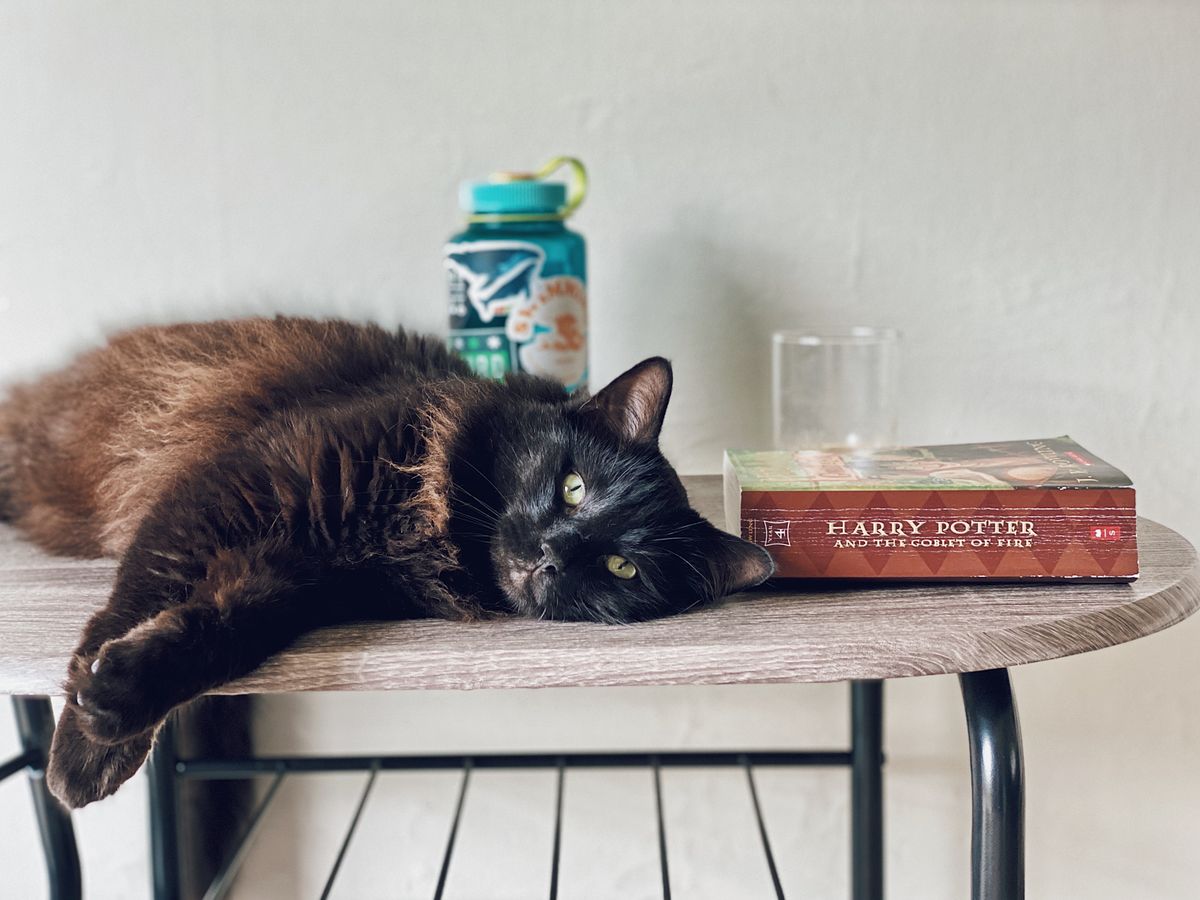
It’s always been hard for me to take time off when I am not feeling well. I feel guilty and spend an inordinate amount of time sitting at my desk doing a whole lot of nothing, procrastinating, but feeling pressured to push through.
Some of this pressure is built into North American hustle culture. There is this idea that you need to soldier on, regardless of how you feel. Lean in, fight through, push harder. Don’t be such a baby. But some of this pressure is internal because I have tied some of my self-worth to how productive I am.
I am not what I produce
I have had to work hard to shift this thinking:
- I am not what I produce each day.
- Getting a ton of work done does not equate to me being a good person.
- Not every day is going to be a slam dunk.
- I can get nothing “done” and still be a good person.
- I can rest and still be a good person.
Instead, I am reframing, “I didn’t get anything done today” to “I took care of myself today so that I can do better tomorrow”.
It changes the decision from what I am not doing today, to what I am doing today in service of my future.
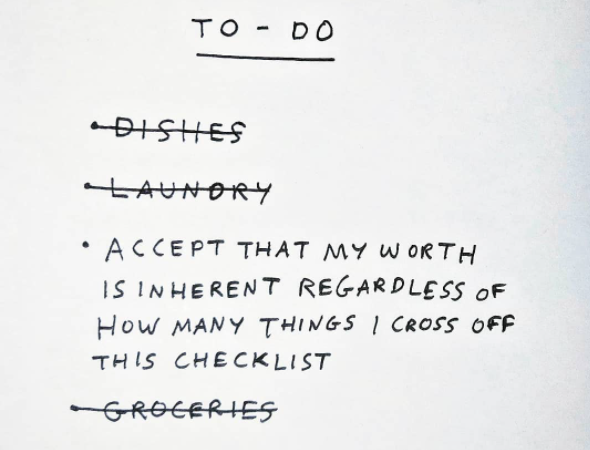
Self-care is a competitive advantage
My long-time readers and consulting clients know I repeat over and over the mantra that self-care is a competitive advantage:
- No one does good work when they’re unwell.
- No one makes good decisions when they’re exhausted.
- No one is super creative and inspired when they feel like garbage.
When you’re tired, everything takes longer than it should and you increase the likelihood that whatever you “work” on will not be the quality you want.
So why force it?
Instead, think about self-care as a way to build a competitive advantage in life. It will help you make good decisions, be more productive overall, tolerate the annoyances of the day, and get creative and inspired.
Self-care is “the practice of taking action to preserve or improve one's own health.” [1]
It’s anything that refuels you when you are unwell, exhausted, and feel like garbage. The obvious self-care tactics are good sleep, regular movement, healthy food, and fresh air. But self-care takes many forms for everyone.
When you think about what self-care means to you, consider:
- Where do you get your energy from? Do you recharge by being alone or with others?
- What things do you know will recharge you?
- What things do you know will drain you?
Also, remember that self-care doesn't have to be an activity. It can be things like setting boundaries around your time, saying no, or asking for help.
Sometimes, self-care is giving yourself permission to take a day…and then taking it.
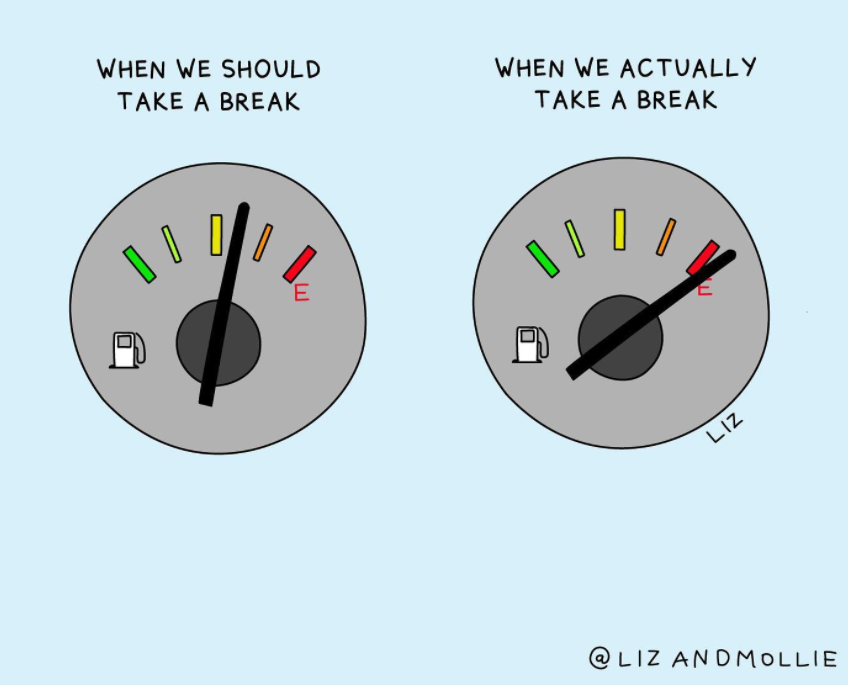
The Minimum Viable Day
You might have heard the term Minimum Viable Product (MVP) connected to entrepreneurship and startups. It describes:
“a version of a product with just enough features to be usable by early customers who can then provide feedback for future product development.”[2]
More bluntly, an MVP is the smallest amount you can build or release of something to see if it works.
The MVP approach is intended to save time, energy, and money because you don’t spend them on the wrong things.
The same concept applies to the Minimum Viable Day (MVD). I first came across the term through a Medium article by Rebecca Pendleton. The gist is this:
When you are feeling unwell and really struggling at work, look at your to-do list and aim to only get the highest priority tasks done. Do the absolute minimum today. Everything else can wait until tomorrow.
This approach will save your time, energy, and money because you are not wasting them on crappy work. Instead, you are investing in recharging, healing, and taking care of your mind and body.
You are cultivating that competitive advantage by setting yourself up to come back feeling good and ready to do good work.
How to take a Minimum Viable Day
There is nothing worse than feeling terrible, forcing yourself to work all day, only to do a poor job anyway and feel even worse. Oh, and also guilty about it.
Instead of muddling through days like these, follow these steps to take a Minimum Viable Day:
1. Review your to-do list
Take a look at your to-do list and ask yourself:
- What absolutely has to be done today?
- Are there any meetings that can be postponed?
- What can be pushed to tomorrow, later in the week, or even next week?
Prioritize anything time-sensitive. Everything else can wait.
Don’t have a to-do list? Then make one and come back to this step!
2. Time-block your postponed tasks later in the week
Take your remaining tasks and see when you might slot them into your calendar later in the week. Time blocking helps alleviate some of the worries about when you will do them and reduces that guilt.
If you want to learn more about time-blocking, read my post on Time-Blocking and Imagining Your Ideal Week.
3. Do the minimum on your list for the day
Answer any emails, take any meetings, do what you feel like you have to do.
4. Give yourself permission to take the rest of the day to recharge
Set your out of office notice on your email and take the rest of the day off. And I actually mean off. Not staring blankly at your inbox. Not pretending to work on something only to delete everything you did because it was so bad. Actually rest. You will set yourself up to recharge so you can come back the next day feeling better.
If you can’t take the day off for some reason, think about what you could do that is light and easy.
5. Judge the success of your day based on finishing the few things you HAD to do and then just making it to the end of the day
The most important part (for both) is to try to let go of the guilt of not getting enough done. Guilt only adds to the drain and, if you do take the day off, stops you from actually recharging.
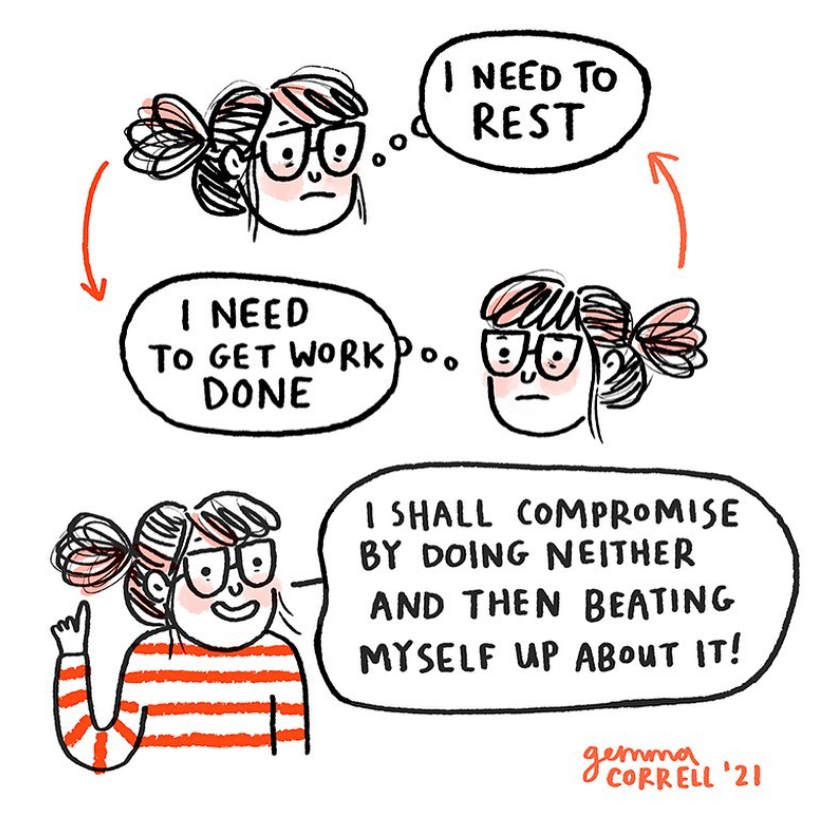
6. Reflect on why you are feeling the way you do
When you have a hard day or week, it’s valuable to take a few minutes to think about why you feel the way you do.
- Have you been working more than usual?
- Have you been skipping breaks and lunch?
- When was the last time you had any time off?
- Are you sick with a cold or flu?
- Have you been sleeping poorly?
Sometimes your cat wakes you up 5 times in the night yelling in your face (I’m looking at you, Penny…). Sometimes you are not making time for self-care in your day and it’s adding up. Sometimes you catch the cold that has been going around your kid's classroom. Sometimes you are just having a hard day!
7. Change it or accept it
There are things you have control over (your own daily self-care) and things you don’t (your cat being a jerk and your kid’s classroom being a petri dish).
If there is something you can change, do it. Maybe you need to book lunch in your calendar so that you don’t get meetings scheduled over it. Maybe you need to take some long weekends or an actual vacation. Maybe you need to set stronger boundaries around your work and off-time so you are not working late.
If whatever is making your feel unwell is out of your control, accept it and control the thing you can: how you respond.
If you have a bad sleep, go to bed early the next night. If you catch a cold, take the time to recover. If you are having an off day, forgive yourself for being human and rest.
Take time to take care
There will always be more work, more emails, more meetings. They will all be there when you get back. For most, nothing bad will happen if you take your minimum viable day off. You will not get an award for soldiering on. You will actually probably make yourself feel worse.
Instead, take a Minimum Viable Day to take care so you can recover. Choose to make self-care a priority so you can have your competitive advantage in life and get back to feeling good.
If you are experiencing burnout and need some help to calm things to get back to a healthier place, I can help!
Share
Ashley Janssen

Productivity consultant, writer, speaker, serial entrepreneur, chaos calmer, introvert, cat-lady. Lover of books, fitness, old fashioned’s, basketball, and video games.
Follow me on
Twitter
or
LinkedIn.
Hire me for
1 on 1 productivity consulting
or
speaking.
Related articles
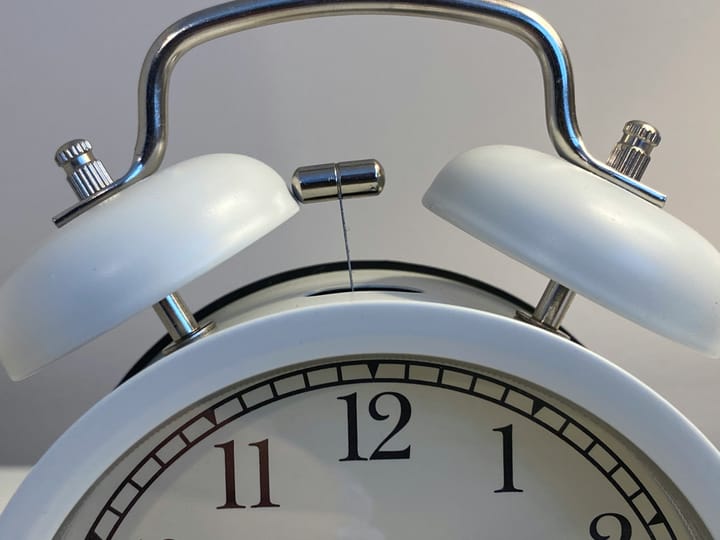
Why Are You Productive For "Only" 5-6 Hours Each Day?

Preparing For The Long Winter Ahead
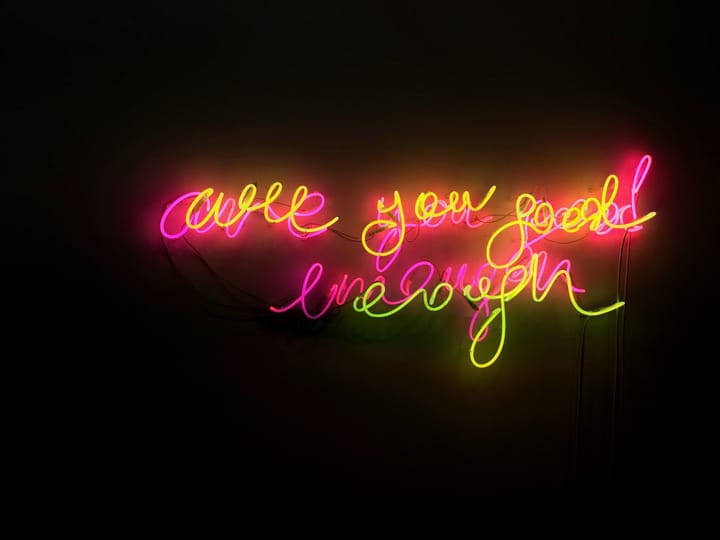

Comments ()